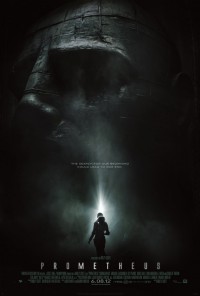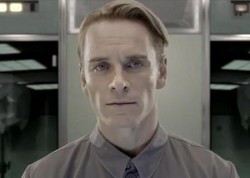Review: Prometheus
June 12, 2012 in General Topics
When a director revisits an old cinematic sandbox, it’s always a risky proposition. Dabbling with the mythos surrounding a nigh-legendary masterpiece like Alien runs the risk of upsetting the audience, particularly the loyalists surrounding a franchise. Every new beginning faces the chance of being a phantom menace. For every Star Trek: First Contact, respecting and enriching its canon, there’s a Star Trek: Nemesis, completely ignoring it.
When I first heard of Prometheus — and that director Ridley Scott was going to craft a spiritual prequel to his landmark 1979 film — I started to worry greatness would be tainted. I saw the film this past Friday, and I’ve had time to digest it since then. So, how does Prometheus stack up against one of the finest science fiction films of all time? Did the same director that gave us Blade Runner meet expectations, or fall short?
At least for this viewer, I was thrilled to see the film surpass my expectations.
First of all, this is a Ridley Scott film, sure, but the name methinks will be abuzz around Oscar season is going to be Michael Fassbender. He delivers the film’s strongest performance as David, a Weyland Incorporated android.  David is a richly multi-dimensional character, and Fassbender’s performance puts his rendition of the supposedly-unfeeling android in the same league as Brent Spiner’s work.
David is a richly multi-dimensional character, and Fassbender’s performance puts his rendition of the supposedly-unfeeling android in the same league as Brent Spiner’s work.
It’s appropriate, too, since the voyage of the film’s eponymous vessel begins with a portrayal of David’s existence on board, as the only crew member needing no hypersleep. In many ways, the film is book-ended by David’s actions.
At this point, I’d be moving squarely into spoiler territory, so I’m going to stop and just touch on the film’s larger themes.
And make no mistake, this is a film of themes. Prometheus dishes up plenty of terror (armrest-gripping terror, in spots), sweeping vistas, and excellent effects, but the most interesting part of the film is its marrow, and not its meat. What lingers with the observant viewer are the big questions Scott asks. As gritty and placental as the film is in its portrayal of birth, death, and rebirth, the stronger elements in its composition are ponderings on the nature of mankind’s existence.
Are we simply genetic material that got lucky? If we were “engineered” — almost like test-tube babies — does it preclude our own significance? And what of our creations? Do we grant them the right to explore the meaning of their own “lives”, or do we (arrogantly, the film suggests) box them in?
Between scenes of malevolent life forms and future-tech eye candy, the film is saturated with religious overtones, and strikes an excellent balance of granting equal strength to its secular and dogmatic pillars. Here is a film that portrays a rising, cloud-parting space ship in the same scene as an almost monk-like supplicant, whose actions are not dissimilar to sacrificial rituals from a number of dogmatic belief systems. Watch as a man has his feet anointed by his own creation, his own “son”. Behold the remarkably prominent presence of a Sistine Chapel-like mural, and a stone monument that wouldn’t be out of place on Easter Island.
I’ve often said that if we ever meet aliens, their ramp will descend and we will discover — to the shock of many — the presence of religious icons among their artifacts. Scott’s film is brave enough to take that concept and put it on film, and he challenges his audience by doing so.
Outside of these deep questions, the writing itself is fairly strong, if sometimes marred by a few predictable, or unresolved areas. As I mentioned, special effects are basically perfect, though the elderly Peter Weyland’s makeup leaves something to be desired. Supporting characters shine in the film, especially some of the ancillary players who at first seem afterthoughts. And while the film respects the world-building in Alien, plenty of questions remain unanswered. This is a good thing, despite what you might have read in other reviews.
The only real casualty of the film is that for hardcore Alien nerds like myself, I will no longer have the fun of ruminating over just what the Space Jockey was.
If you want the summation, here you go: Prometheus delivers. It is deeper than one expects and, at least for this viewer, its questions linger long after it rolls credits. That is the mark of exceptional film-making — and top-notch speculative fiction.
4/5 stars.
Stay tuned.

Recent Discussion